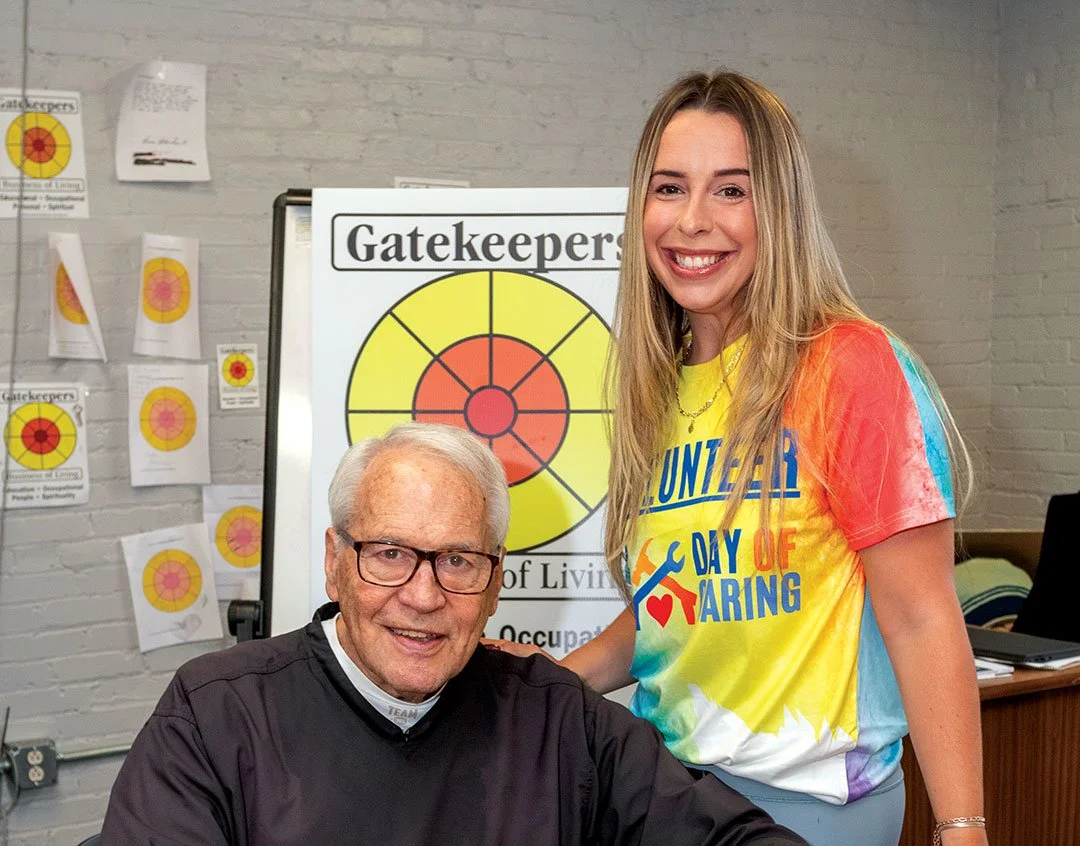Dignity on the Rise
Gatekeepers founder Bill Gaetner and outreach coordinator Julia Smoot. Photography by Mark Youngblood
Re-integrating into mainstream society after incarceration can be a daunting challenge, but a local organization offers help
By Laura Forrest Hopfauf
In 2013 when Bill Gaertner was released from prison, he knew that he had more to give society. By 2014 he established Gatekeepers in Washington County with the goal of helping current and ex-offenders successfully transition back into their community.
Today Gatekeepers is a lifeline for individuals as they re-enter society from incarceration by providing support, building relationships, and helping with basic needs.
“We meet individuals where they are and offer personalized support. A full basic needs package costs about $5,000 for three months and may include a basic smartphone with insurance, clothing, hygiene supplies, bus passes, a backpack, and housing assistance,” says executive director Keith Roys. “The goal is to stabilize people so they can build
forward momentum.”
Anyone in Washington County can visit the Gatekeepers office at 223 North Prospect Street Monday through Friday 9 a.m. to 3 p.m. or reach them anytime by email or phone if they need help or know someone who does.
Every Saturday morning doors at Trinity Lutheran Church open at 9:30 for Gatekeeper’s weekly Resource Club meeting. The get-together regularly welcomes an average of 80 people who are returning citizens or in recovery and helps connect them with community resources like the Washington County Health Department, Maryland Motor Vehicle Administration, CASA, and more to answer questions and provide training. Local employers and community housing providers are also present to talk about job openings and locations with available beds. But beyond all that, Gatekeepers and its resource meeting are a safe place for fellowship and growth for justice-involved individuals.
From left to right: Shane Mcgreger, Heather Tenly, Alva Moses, Trina Earl, Tonya Tate, Julia Smoot, and former Hagerstown mayor Tekesha Martinez. In front is founder Bill Gaertner.
Even inside Roxbury Correctional Institution in Hagerstown, Gatekeepers presents a weekly Business of Living program, a personal re-entry plan that prepares individuals to transition back into society.
“We help individuals identify their challenges and build a plan that addresses them,” Roys says. “These challenges might include no stable housing, lack of ID, debt, no job prospects, limited education, addiction, mental health concerns, and disconnection from family or support networks. Gatekeepers help tackle those issues head-on. We offer mentorship, resources, and community connections so individuals don’t feel like they’re facing the world alone.”
Reincarnation is a real and challenging problem, but Gatekeepers is actively combating that in Washington County.
“The county’s recidivism rate is around 40 percent, while the rate for individuals actively involved with Gatekeepers hoovers around 2 percent,” Roys says. “That’s a dramatic difference…we’re helping people stay home, thrive, and contribute to the local economy. They live, work, shop, vote, and worship right here in Washington County.”
In a world that isn’t full of second chances, Gatekeepers is making a difference in the lives of many by providing a safe haven and a plan forward along belief and dignity.
Julia Smoot, the outreach coordinator at Gatekeepers and a successful participant of Gatekeepers says, “when I came home from incarceration, I was overwhelmed. I didn’t know what my next step was supposed to be or how I would rebuild my life. That’s when I found Gatekeepers. They didn’t just offer help, they offered me a fresh start, a place where I could be seen for who I was becoming, not who I used to be. What impacted me most was the relationship. Gatekeepers believed in me when I wasn’t even sure I believed in myself. They reminded me that I still had something to give, that my story wasn’t over.”
Gatekeepers understands the value of the individual and looks beyond their past as they help them move forward in the world that often overlooks and undermines those who have served time in prison.
Darrell Briscoe, a participant of Gatekeepers who has successfully transitioned back into society, says, “Beyond the practical help, what really stood out was mentorship. I had people who understood what I was going through because they had walked a similar path. They didn’t judge me. They supported me, held me accountable, and reminded me that I still had value. That meant everything. Gatekeepers didn’t just give me resources, they gave me a real chance to start over with dignity.”
Building a life outside of prison that lasts isn’t just about doing the right things, it’s about doing them for the right reasons. By building self-worth in individuals who have been stripped of it, Gatekeepers helps lift people so that they know they can make the right choices for themselves.
“Gatekeepers understands that reentry is about more than resources,” Smoot says. “It’s about rebuilding a life with dignity. They don’t just hand out items or make referrals. They walk with people. They show up. They offer accountability and care, rooted in real lived experiences. Organizations like Gatekeepers are proof that when you invest in people, they rise. I’m living proof. I went from incarceration to leadership. From needing help to offering help. And it’s all because someone believed in me long enough for me to start believing in myself.”

